7 MORE NEW ONES – 20% OFF
Some folks seemed to appreciate the quick listing of 15 brand new books in the most recent BookNotes. I didn’t want to overdo it, but I had thought of listing these new ones as well.
So, here ya go, a postscript to the BookNotes from the other day — seven more that are quite new and in some cases brand new. I have hardly opened the pages of some of these (although a few I’ve read in advanced manuscripts form which the publishers were kind enough to share with me months ago.) Here we go, announcements of new books about which I’m sure you would want to know. Send us an order to Hearts & Minds today. Use the secure order form at the end, and we’ll take care of the rest, deducting the discount with a smile.
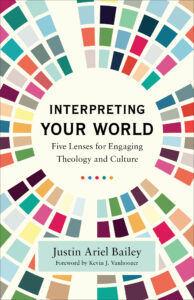 Interpreting Your World: Five Lenses for Engaging Theology and Culture Justin Ariel Bailey (Baker Academic) $21.99 OUR DISCOUNT PRICE = $17.59
Interpreting Your World: Five Lenses for Engaging Theology and Culture Justin Ariel Bailey (Baker Academic) $21.99 OUR DISCOUNT PRICE = $17.59
Yes, this is on the excellent Baker Academic imprint, but not all on that imprint are hefty textbooks. This is a bit serious but for any educated reader and anyone who wants to nurture their holy calling as culture makers it will be, I am sure, a excellent resource. As one reviewer put it, it is “equal parts innovative, surprising, and enlightening, this book sings.”
Interpreting Your World just came so I can’t say for sure, but I am guessing this book about a theology of flourishing is going to be stunning, something I’m going to savor through the fall and draw on for years to come. This is the broad book about a deep hunger for meaningful living — clearly in response to the triune God of the sacred story in Scripture — that seemed between the lines of Justin Bailey’s early heft volume on fresh ways to think about the art of apologetics, Reimagining Apologetics. For those aware of the nuances of various sorts of Reformed theologians, you might get a kick out of knowing Bailey teaches at Dordt University in Iowa.
Here are two spectacular endorsements:
Bailey offers readers a profound gift. With clarity and skill, he introduces us to the dynamic ways theology and culture intersect. Rejecting simplistic and reductionistic Christian understandings, this book introduces us to the complex field of human action and divine grace that we call culture. — Matthew Kaemingk, Richard Mouw Institute of Faith and Public Life, Fuller Theological Seminary, co-editor of Reformed Public Theology: A Global Vision for Life in the World and co-author of Work and Worship: Reconnecting Our Labor and Liturgy
Justin Bailey’s theology is a theology of flourishing, a theology that understands an artist’s heart. His discourse enters into culture not just to engage it but to liberate it. This is a theology that is integrated and quite beautiful to behold. Interpreting Your World offers a lens for cultural goodness and for the sanctification of our imaginations; it is an invitation into new creation. — Makoto Fujimura, artist and author of Art and Faith: A Theology of Making and Culture Care: Reconnecting with Beauty for Our Common Life
I’ve glanced through the discussion questions at the end of each chapter and they are provocative and interesting, making this ideal for a study group. His appendix on discerning the nature and meaning of cultural artifacts by way of the five lenses itself is extraordinary. Highly recommended.
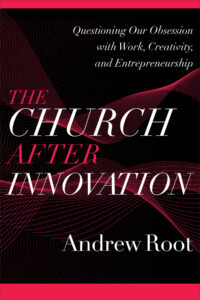 The Church After Innovation: Questioning Our Obsession with Work, Creativity, and Entrepreneurship Andrew Root (Baker Academic) $27.99 OUR DISCOUNT PRICE = $22.39
The Church After Innovation: Questioning Our Obsession with Work, Creativity, and Entrepreneurship Andrew Root (Baker Academic) $27.99 OUR DISCOUNT PRICE = $22.39
Oh man, I’m so excited about this. It just came and I can’t say much about it, but you may know that Root has been doing a whole series of very mature reflections on the nature of the church in these times, in this secular age. Yes, earlier works in the series put congregational life (and one on pastoring) into conversation with the likes of social critics and intellectuals like Charles Taylor.
In each of these stimulating volumes — the previous one came out about a half a year ago, entitled Churches and the Crisis of Decline: A Hopeful, Practical Ecclesiology for a Secular Age — Root brings fresh analysis of the ways our Western culture and our contemporary trends have shaped and influenced how we presume churches ought to work and wonders, with great theological awareness, how authentic and faithful spirituality might mitigate these deforming influences.
There are tons of amazing quotes on the back of this brand new book. Some are saying it is the best one yet — “perceptive and engaging, a godsend for leaders and pastors.” The back cover explains the book like this:
The call for pastors and congregations to be innovative can have a dark side: an obsession with contemporary relevance and entrepreneurship that lacks theological depth and promises burnout and exhaustion. The Church After Innovation shines a light on the problem and offers a treatment.
I like what Brian Brock (now at the University of Aberdeen) says, “There’s something satisfying about a story that is this big, bold, and revealing about how our cultural presumptions came to be — especially when so beautifully told.
“There’s something satisfying about a story that is this big, bold, and revealing about how our cultural presumptions came to be — especially when so beautifully told.”
And part of that big story, apparently, is going to be how chasing church innovation (often for the sake of numerical growth) may be rooted in our tacit assumptions — the air we breathe — learned from consumerism and late modern capitalism. Richard Beck puts in succinctly:
With penetrating analysis and prophetic force, Root exposes how the false idols of capitalism are being smuggled into the church through the Trojan horses of innovation and entrepreneurialism. A bold, necessary, and urgent book. — Richard Beck, Abilene Christian University; author of Hunting Magic Eels: Recovering an Enchanted Faith in a Skeptical Age
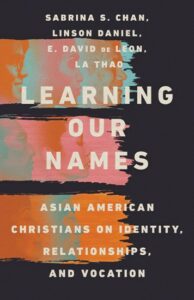 Learning Our Names: Asian American Christians on Identity, Relationships, and Vocation Sabrina S. Chan, Linson Daniel, E. David de Leon, and La Thao (IVP) $20.00
Learning Our Names: Asian American Christians on Identity, Relationships, and Vocation Sabrina S. Chan, Linson Daniel, E. David de Leon, and La Thao (IVP) $20.00
For decades and decades, the thoughtful, evangelical campus ministry InterVarsity Christian Fellowship has been shaped by their many Asian-American students, many who have risen to leadership within the large organization. For decades their publishing division, one of our favorite publishers, IVP, have released books about the identity and unique struggles of Asian Americans, espeically for college age young adults.
For instance, the classic Following Jesus without Dishonoring Your Parents or Tom Lin’s Losing Face & Finding Grace: 12 Bible Studies for Asian-Americans; Invitation to Lead Guidance for Emerging Asian American Leaders by Paul Tokunaga, More Than Serving Tea: Asian American Women on Expectations, Relationships, Leadership and Faith edited by Nikki A. Toyama-Szeto and Tracey Gee, and Growing Healthy Asian American Churches edited by Peter Cha, S. Steve Kang, and Helen Lee, among others. Although more academic, I am very excited to see the forthcoming Doing Asian American Theology: A Contextualized Framework for Faith and Practice coming in November 2022 by Daneil D. Lee. Send us a pre-order today!
Learning Our Names (which opens with a rumination by Sabrina Chan on the various itineration of her name in Mandarin and Cantonese) is a fabulous, excellent, new collaboration by four IVCF staff or former leaders — part of families from Hong Kong, India, Philippines, and the Hmong people group. Chan is the national director of IVCF’s Asian American Ministries, working out of Durham, NC, Daniel is now a pastor of a multi ethnic church in Dallas, de Leon is a doctoral student at Fordham (in NYC) and Thao works on campuses in Wisconsin. What a diverse and delightful set of contexts! Skimming the chapter titles and topics and discussion questions makes me want to read this soon. Kudos to this unique team for the gifts they’ve offered here and for the publisher who so handsomely designed it.
This book is, I suppose, firstly for Asian American persons and faith communities as the authors offer up to the minute insights and guidance for navigating the unique waters of our times, looking at spirituality and discipleship, interpersonal relations, vocational calling and family and ethnic identity. Solid Christian perspective for those living in the “multiple tensions” of being Asian American Christians, coping with pressures of being seen as “the model minority” or the “perpetual foreigner.”
A timely and expansive exploration for both Asian Americans and those who want to learn by entering into the stories and experience of Asian Americans. — Nikki Toyama-Szeto, executive director, Christians for Social Action
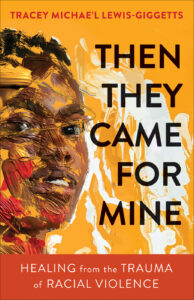 They Came For Mine: Healing from the Trauma of Racial Violence Tracey Michae’l Lewis-Giggetts (Westminster John Knox) $19.00 OUR DISCOUNT PRICE = $15.20
They Came For Mine: Healing from the Trauma of Racial Violence Tracey Michae’l Lewis-Giggetts (Westminster John Knox) $19.00 OUR DISCOUNT PRICE = $15.20
This is brand new and I cannot say much other than it is humbling and moving to even it hold it in my hands, skimming the footnotes, seeing who this brave author draws upon and recommends, a bit about her story, her journey, her rigorous scholarship and her audacious commitment to the ongoing freedom movement. As you might guess, the title is an allusion to a riff she does on Martin Niemoeller’s famous speech about the need to stand up for each other. The book is, as the wonderful writer and lively thinker Dante Stewart (of Shoutin’ in the Fire: An American Epistle) puts it:
Part memoir, part mediation, part manifesto, this work has the character and skill of poetry, the brilliance of grace, the mystery of Black wisdom, and the illumination that the world we have been given is not all that there is to life.
If the book we’ve highly recommended for several years on this topic, Healing Racial Trauma: The Road to Resilience by Sheila Wise Rowe (with a foreword by Soong-Chan Rah) remains our first go-to selection on this complex topic, They Came for Mine may indeed be the natural follow up. It, too, cites the exceptionally moving My Grandmother’s Hands: Racialized Trauma and the Pathway to Mending Our Hearts and Bodies (by Resmaa Menakem) and, of course, the must-read volume on trauma, Bessel Van Der Kolk’s The Body Keeps the Score. There is some overlap, I suppose.
But I gather that the new Lewis-Giggetts is (as you might expect from WJK) from a more liberationist perspective, with citations from James Baldwin, intersectional scholars, Toni Morrison, and a cadre of anti-racist workers.
The blurbs on the back are compelling. Two that illustrate the authors orientation, by significant writers in this radical tradition — Chanequa Walker-Barnes (professor of Practical Theology and pastoral Counseling at Columbia Theological Seminary and author of I Bring the Voices of My People: A Womanist Vision for Racial Reconciliation and Jacqui Lewis, who is described as a public theologian and the first Black or female senior minister at the progressive, multicultural Collegiate Church in Manhattan. A graduate of Princeton Theological Seminary and Drew University, she is the creator of the MSNBC online show Just Faith and the PBS show Faith and Justice, in which she led important conversations about culture and current events. Jacqui is the author of Fierce Love: A Bold Path to Ferocious Courage and Rule-breaking Kindness That Can Heal the World.
As you can see, this volume stands in the robust tradition of womanist and activist black theologians and is clear about the ongoing trauma of inhabiting a black body in a culture defined by white supremacy. If you get that, this book will be a valuable guide to deeper awareness and deeper healing admist our racist society. If you are suspect of this claim, I invite you to consider it. It reminds us of why we must #SayHerName, sadly, over and over. This stuff is not going away, so we need serious resources like this. Please check it out.
Tracey Michael Lewis-Giggetts is author of the 2020 release, Choosing Your Lens: How White Christians Can Become Better Allies and is the founder of HeARTspace, a healing community that uses storytelling and the arts to serve those who have experienced trauma. Her work has appeared in The Washington Post, Essence Magazine, Oprah Daily, and more.
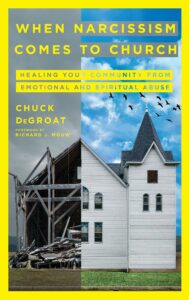 When Narcissism Comes to Church: Healing Your Community From Emotional and Spiritual Abuse Chuck DeGroat (IVP) $18.00 paperback OUR SALE PRICE = $14.40
When Narcissism Comes to Church: Healing Your Community From Emotional and Spiritual Abuse Chuck DeGroat (IVP) $18.00 paperback OUR SALE PRICE = $14.40
I do not have to say much about this new paperback release as we have reviewed it before. It has been much discussed and really appreciated by many since it first came out in hardback — yep, in mid-March, 2020, just as the Covid pandemic was hitting us all. Not a great time for a book release, although, oddly, an important title for those very times. Maybe the know-it-alls didn’t “come to church” in person, but they were around. Not a few churches had hard fall-outs with strong personalities demanding this or that.
One is tempted to cite The Talking Heads song and sigh, “Same as it ever was.” Yes, pride and stubbornness plagues any human organization and churches have plenty of oddballs and bullies. Maybe more than some organizations. We need to know how to handle such hard stuff.
When Narcissism Comes to Church is really good for any sort of congregation, and good for anyone to read even for other contexts, it certainly is a must for any congregational leader. It does focus on this particular diagnostic disorder: narcissism. DeGroat is a pastoral counselor and knows his stuff. He shows how these tendencies are around, all over many of our best churches and para-church ministries; he explores in wonderful prose how the narcissism disorder itself can show up. And what to do, with goodness and grace.
There are, I might add, importantly, a couple of very good chapters on the narcissistic pastor. Yup; that’s a thing.
Why does narcissism seem to thrive in many churches? This is a vital book, perhaps the only thing of its kind, trying to answer that. Blurbs on the back are from Dan Allender, Curt Thompson and Nancy Ortberg. A great forward is written by Richard Mouw which says a lot. As Dan Allender puts it, When Narcissism Comes to Church is “a landmark work of wisdom, tenderness, honor, and hope.”
Now this landmark book is in paperback. It’s now a couple of dollars cheaper and you could buy several at our discounted price. It’s worth working through (as are, by the way, his other good books.) Congratulations, Chuck!
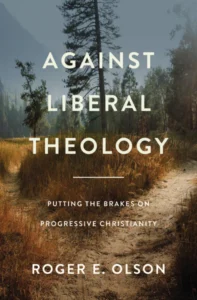 Against Liberal Theology: Putting the Brakes on Progressive Christianity Roger E. Olson (Zondervan Reflective) $18.99
Against Liberal Theology: Putting the Brakes on Progressive Christianity Roger E. Olson (Zondervan Reflective) $18.99
This is a book I tore through, eager to read and absorb, and I liked it a lot. Mostly. We are happy to commend it. Let me explain, too briefly.
I’ll just say three quick things.
Firstly, this is not a book about what sort of social implications we think the gospel carries, what kind of public ethic we work for, how we ought to be people of justice, creation-care, racial reconciliation and the like. He favors that sort of robust Kingdom theology that sees — perhaps somewhat like the theologically impeccable friend of his, the late Ron Sider — the Bible relating to all of life and the Lordship of Christ over culture and its deforming idols. He’s thoughtful and, frankly, not conservative, theologically, and certainly not politically. No worries there. This is a book about theology as such, and he goes to great lengths to be clear just what he is worried about (and what he is not addressing.) Don’t misunderstand the term “liberal” or “progressive” as having anything to do with politics as that isn’t his topic.
Secondly, although he is greatly concerned about a trajectory among some that for perhaps even understandable reasons, is moving towards deconstructing and eroding fairly classic, standard, historic doctrines of orthodox faith, he is not mean-spirited, not a fundamentalist, not judging motives, or fixating with nuances of small disagreements. He is no-nonsense in a way, just naming clearly what he sees and backing it up with quotes that alarm him (from the late Marcus Borg, say, or Brian McLaren or Doug Ottati — three gents I have met and, like Olson, can happily respect; Brian is an old friend who I very much appreciate.) Olsen is wanting to be clear and candid although his book isn’t quite as terse as, say, the classic Christianity and Liberalism written by the former Princeton professor J. Gresham Machen in 1923 — almost one hundred years ago.
Thirdly, while I am not totally in agreement with his assessment of the dangers of some liberal theology, he is, I think, mostly correct, in both his analysis of contemporary trends and his critique of older, classic, theological liberalism. He goes a good job, though, drawing on the magisterial volumes by Gary Dorrien, especially The Making of American Liberal Theology: Crisis, Irony, and Postmodernity, 1950-2005 and, naturally, shows the detrimental impact of the likes of Friedrich Schleirmacher, Adolf von Harnack, and Paul Tillich, up to John Spong, for instance.
Roger Olson has written many good books. Interestingly, in Against Liberal Theology he speaks of working for two mainline denominational churches — one pastored by a disillusioned Baptist, the other by a mainline liberal Presbyterian — so he has seen this lack of gospel-centered clarity play out in congregation life, in preaching and Christian ed, family ministry and mission. I see, now, why he wrote the very interesting Counterfeit Christianity: The Persistence of Errors in the Church (Abingdon Press.) I really liked his concise paperback, Who Needs Theology? An Invitation to the Study of God, co-written with his own rather postmodern friend, the late Stanley Grenz. His largest volume is the wonderful clothbound, The Mosaic of Christian Belief: Twenty Centuries of Unity and Diversity (IVP Academic.) Perhaps most germane to this new book is his 2008 release, How to Be Evangelical Without Being Conservative (with a forward by Scot McKnight.) It is out of print — ahh, if only it had sold more! — but we have a few left, natch.
McKnight endorses this one, too:
Roger Olson’s Against Liberal Theology is a courageous and calm definition, examination, and evaluation of the collapse of authentic, orthodox Christian theology in the minds, hearts, and hands of one liberal (not progressive) theologian after another. In their own words, Olson often shines a bright, piercing light on their own criticisms. This is a vintage example of Olson being Olson: he knows the literature, he is candid, he is fair, and he is unstinting in criticism of the pitfalls of liberal theologians. And he examines only those who overtly espouse ‘liberal’ in their theology. Those most attracted into progressivism and then into liberalism will benefit from a humble reading of this book. — Scot McKnight, professor of New Testament, Northern Seminary, author, most recently, of My Theology: The Audacity of Peace
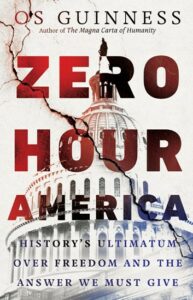 Zero Hour America: History’s Ultimatum Over Freedom and the Answer We Must Give Os Guinness (IVP) $23.00. OUR SALE PRICE = $18.40
Zero Hour America: History’s Ultimatum Over Freedom and the Answer We Must Give Os Guinness (IVP) $23.00. OUR SALE PRICE = $18.40
It is never a bad day when a new Os Guinness book shows up. He is always my teacher, a long-time supporter of our family-run bookstore, and an admirable example of a Christian leader who speaks often in secular, scholarly circles — think tanks, study centers, action groups, professional organizations, civic projects, even the United Nations. His book The Call is on my short list of all-time favorite books. He is best known in evangelical circles, known for his astute observations, his impeccable, note-less speechifying, and his wise, non-partisan call for God’s people to be in but not of the world around us. He is sometimes known as a public intellectual, sometimes a cultural critic, often as a passionate evangelical preacher. His PhD is from Oxford where he studied the work of the significant Lutheran sociologist Peter Berger. Os describes his own inspiration drawn from the three scholars who most influenced his thinking and life in the wonderful Fool’s Talk: Recovering the Art of Christian Persuasion. Those three influences, mentors of sorts? C.S. Lewis, Francis Schaeffer, and Peter Berger.
In Dr. Guinness’s last major book, the 2021 volume The Magna Carta of Humanity, he added a fourth to his list of most appreciated mentors, the beloved and highly respected late Rabbi of London, Jonathan Sacks. In that volume Guinness conscientiously showed connections between the Hebrew God and consequent Biblical worldview — shaped by ordered law and virtuous freedom — that so formed the best of Western views of civic life and certainly the framers of the US Constitution. As a Brit living in the US, Guinness feels a certain responsibility to honor his American guests by sounding the alarm at the dangers he perceives threatening our almost 250 year-old Republic. (In 2012 he wrote a book called, notably, A Free People’s Suicide.) He has several books on what he once called “The American Hour” and is a globally respected voice on religious pluralism and sustainable freedom. He may be one of the best — if not best known — of democracy’s allies that the contemporary world may now have. That he has experienced the ravages of communist terror (he was born and lived his earliest years in China and lost loved ones to the Most takeover) is itself a poignant matter of personal credibility.
As he says throughout his Magna Carta book, and in many stirring lectures given in recent years, it is imperative that we reflect on the differences between the awful French Revolution of 1789 and the momentous US Revolution of 1776. Some of you may be old enough to recall that scene in Francis Schaeffer’s How Should We Then Live film (or book) showing the implications and historical consequences of these two vastly different revolutions, one leading to mass totalitarianism, the other to a flawed but beautiful vision of freedom for all.
It grieves me to say that I was not sure what to make of Zero Hour America since he had just published the weighty The Magna Carta of Humanity last year. I figured this was, perhaps — to use an image from the days of rock and roll recordings — a collection of outtakes, alternative versions, unedited extras, bonus tracks for the true fans. I think I was mostly right. And, as with those quirky CD releases, some of the newly released material from a previous recording session might have come from the cutting floor, stuff that didn’t make the first release. Or fiesty reworkings of some of the same stuff, maybe making it even more compelling; true fans will probably think they’ve heard some of this before, but with a new sort of reverb and some louder kick drums.
Perhaps this is wrong of me, and I do not mean it to be unkind. But Zero Hour is a slimmed down, passion-driven, cry of the heart — Os’s plea for us to wake up before it is too late. For careful readers, there isn’t much new, although, yet, every page has new quotes, new citations, new examples, re-saying much of what has been said before, underscored. He draws on such a wide array of sources, citing with approval ancient scholars from around the globe, seeming to particularly appreciate of the likes of Arnold Toynbee. And, of course, the great Abraham Lincoln. HIs working knowledge of global writers and the philosophy of historiography is a intellectual joy to behold.
As I said in my reviews of his previous book, I am in disagreement with him in his assessment of the nature of the threats to democracy. He, perhaps like Rod Dreher (just for instance) acknowledges the threat from the far right, but worries more about the Gramscian long march through the institutions by the so-called Marxian left. He alarms us about the “post-democratic, one-party technocratic elite that have emerged in America to replace American democracy with America’s newly forming authoritarian oligarchy.” I don’t exactly know who that is, or how they are doing that and he doesn’t say. He seems to think it is mostly “the elites” who opposed viscerally the former President Trump. That’s just odd. He condemns the “proto-authoritarians in the political sphere who are blind to their creeping authoritarianism”, now “marching under a banner…” and I guess he means Democrats, but is trying to be courteous in not saying so. That he worries about Black Lives Matters and woke businesses and postmodern professors and Foucault’s disciples isn’t so bad — he makes a fair point — but that he doesn’t talk about the insurrection of January 6th and former President Trump’s big lie, hoodwinking a major part of the American people into distrusting our modern elections, is a nearly unforgivable omission in a book like this, published in the last half of 2022. It is almost as if he wrote this a decade ago, before the notable horrors and massive disinformation of the last few years.
Which is not to say we don’t need to read this book. In fact, those who are likely to be frustrated, as I am, with the direction and tone of the last few books by Os, may need it the most. People who are by constitution conservative and by principle Republican may not need this reminder, although they will be impressed with the balanced, thoughtful, faithful exegesis of our nation’s deepest impulses and ideas. He is not alt-right and has no particular partisan loyalties. Such readers will be fired up by Zero Hour, understandably so.
Importantly, such conservative readers need to be reminded, by a spokesperson they can trust, that, indeed, slavery and racism remains an unreckoned with injustice that cries out to heaven for redress. Guiness is not a fan of the historical assumptions of, say, the 1619 Project (although he never spells out why) but make no mistake: he cares about social justice and has a Biblically-inspired vision of justice for all, each living “under their vine and fig tree.” He has an entire chapter called “Righting Wrongs.” He cares about the abuse of power.
However, again, it may be those of us who are in the center or who tilt left and who remain outraged at the chicanery of the Trumpian movement and the rhetoric of the MAGA idols, who need reminded of some very basic stuff, found — emphatically — here in the latest from the real Dr. Os.
In a rumination on Deuteronomy 17 where the Hebrew king was called to study the covenant “all the days of his life”, Guinness imagines how US Presidents might be called to lead well beyond their swearing in.
Like the great Jewish leader Moses or like Winston Churchill with his immense grasp of history, your task is to guide the destiny of the American republic with a profound and ever-growing understanding of the ideas and ideals of the American republic and the best and worst of the American past. To ‘make America great again’, Mr. Trump, and to ‘restore the soul of America’, Mr Biden, you must address what made America great in the first place.
I wonder if this, icing on the cake of The Magna Carta of Freedom, and its lively prelude volume, Last Call for Liberty, make a trilogy that might help us all clarify what our nation might be about. It is interesting that, in fact, Os calls for such a project to help us recover — or at least clarify — what freedom is within the American experiment.
Guinness writes, “What The Federalist Papers did for the Constitutional Convention, a fresh and powerful restatement of the founding character of America needs to do for our time.”
“What The Federalist Papers did for the Constitutional Convention, a fresh and powerful restatement of the founding character of America needs to do for our time.”
It may not be read as widely as a major release on the international stage, but this could be the very sort of clarification some need.
Guinness’s big themes are reviewed in a final powerfully concise chapter called “Zero Hour America” which is pitched (as is most of the book) as a dire ultimatum. Yet, he is (as he puts it) “fired by hope” and insists that “a warning is not a prediction.”
Yes, he says, “America will fall — unless.” And in covenant hope, therein lies the call. That great “unless.” We may fine-tune what that entails, but he is surely right. We are in a kairos time. I have never heard Os so urgent, so passionate, so fiery. Agree fully or not, this book is a grand summary and reminder, a manifesto of what we must do, soon.
++++
TO PLACE AN ORDER
PLEASE READ AND THEN CLICK ON THE “ORDER HERE” LINK BELOW.
It is helpful if you tell us how you prefer us to ship your orders.
The weight and destination of your package varies
but you can use this as a general guide:
There are generally two kinds of US Mail options, and, of course, UPS. If necessary, we can do overnight and other expedited methods, too. Just ask.
- United States Postal Service has the option called “Media Mail” which is cheapest but can be slow. For one typical book, usually, it’s about $3.69; 2 lbs would be $4.36.
- United States Postal Service has another option called “Priority Mail” which is $8.35 if it fits in a flat rate envelope. Many children’s books and some Bibles are oversized so that might take the next size up which is $8.95. “Priority Mail” gets much more attention than does “Media Mail” and is often just a few days to anywhere in the US.
- UPS Ground is reliable but varies by weight and distance and may take longer than USPS. We’re happy to figure out your options for you once we know what you want.
If you just want to say “cheapest” that is fine. If you are eager and don’t want the slowest method, do say so. It really helps us serve you well.
– DON’T FORGET TO LET US KNOW WHAT SHIPPING METHOD YOU PREFER –
BookNotes
SPECIAL
DISCOUNT
20% OFF
ALL BOOKS MENTIONED
+++
order here
this takes you to the secure Hearts & Minds order form page
just tell us what you want to order
inquire here
if you have questions or need more information
just ask us what you want to know
Hearts & Minds 234 East Main Street Dallastown PA 17313
read@heartsandmindsbooks.com
717-246-3333
It is complicated for us, but we are still closed for in-store browsing due to our commitment to public health (and the safety of our family, staff, and customers.) The vaccination rate here in York County is sadly lower than average and the new variant is now spreading again; rates are rising Our store is a bit cramped without top-notch ventilation so we are trying to be wise.
Please, wherever you are, do your best to be sensitive to those who are most at risk. Many of our friends, neighbors, co-workers, congregants, and family members may need to be protected since more than half of Americans (it seems) have medical reasons to worry about longer hazards from even seemingly mild Covid infections.
We are doing our famous curb-side customer service and can show any number of items to you if you call us from our back parking lot. We are eager to serve and grateful for your patience as we all work to mitigate the pandemic.
Of course, we’re happy to ship books anywhere. Just tell us how you want them sent.
We are here 10:00 – 6:00 EST / Monday – Saturday, closed on Sunday.

